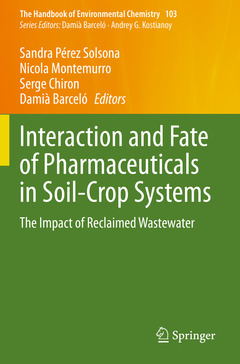Interaction and Fate of Pharmaceuticals in Soil-Crop Systems, 1st ed. 2021 The Impact of Reclaimed Wastewater The Handbook of Environmental Chemistry Series, Vol. 103
Coordonnateurs : Pérez Solsona Sandra, Montemurro Nicola, Chiron Serge, Barceló Damià

This book provides a comprehensive overview of the current knowledge on the fate and interaction of pharmaceuticals in soil-crop systems. It addresses the principles of their transport, uptake and metabolism and reviews methodologies for their analytical determination. It also discusses ecotoxicological effects arising from their presence and highlights bioremediation approaches for their removal.
The use of treated wastewater to irrigate crops is becoming more widespread in regions where freshwater is limited. This practice conserves freshwater resources and contributes to nutrient recycling. However, concerns remain regarding the safety of irrigation with treated wastewater since it contains residues of pharmaceuticals that have survived treatment, which means that soil and fauna are potentially exposed to these xenobiotics. Various pathways govern the fate of pharmaceuticals in crop-soil systems, including soil degradation; formation of non-extractable residues; uptake by soil-dwelling organisms (e.g. earthworms); and uptake, transport, and metabolism in agricultural crops. Investigations into these aspects have only recently been initiated, and there is still a long way to go before a meaningful assessment of the impact of wastewater has been completed.The Journey of Human Drugs from Their Design at the Bench to Their Fate in Crops.- Sources of Pharmaceuticals in water.- Environmental, economic, and ethical assessment of the treated wastewater and sewage sludge valorization in agriculture.- Wastewater Reuse in Agriculture: Effects on Soil-Plant System Properties.- Uptake and Translocation of Pharmaceuticals in Plants: Principles and Data Analyses.- Soil Sorption and Degradation Studies of Pharmaceutical Compounds Present in Recycled Wastewaters Based on Enantiomeric Fractionation.- Uptake and effects of pharmaceuticals in the Soil-Plant-Earthworm System.- Metabolism of Pharmaceuticals in Plants and their Associated Microbiota.- Impact of PhACs on soil microorganisms.- Biomarkers in earthworms.- Vermiremediation of Pharmaceutical-Contaminated Soils and Organic Amendments.- Constructed wetlands and phytoremediation as a tool for pharmaceutical removal.- Development of methods for the determination of PhACs in soil/earthworm/crop system irrigated with reclaimed water.- Analytical approaches for the determination and identification of drug metabolites in plants after uptake.- Conclusions and Future Perspectives.
Dr. Sandra Pérez Solsona, scientific researcher at the Department of Environmental (h-index=41). She has a Ph.D. in Chemistry from the University of Barcelona (2003). Postdoctoral researcher at the State University of New York at Buffalo (2003-2005). Her work is focused on the study of occurrence, distribution and degradation of pollutants in the aquatic and terrestrial environment. Advanced mass spectrometry techniques such as the hybrid techniques UPLC-Q ToF-MS and UPLC-QExactive-MS for the structural elucidation of novel transformation products and metabolites of organic pollutants and (LC-QqQ-MS and LC-QLIT-MS) for the sensitive trace determination of parent compounds and their TPs in the water cycle are employed. Recently, she has expanded her research interest into the field of fate and degradation of polymers in the environment. She has been involved in more than 20 projects (EU, national and US projects). She was principal investigator of CSI-Environment project and National projects as well as coordinator of PRIMA project 2018 (INWAT). Associate editor from TREAC since 2017.
Dr. Nicola Montemurro is a biologist and expert in wastewater treatment for its reuse in agriculture. He holds a PhD degree in Biodiversity, Agriculture and Environment in 2017. His PhD research studied the effects of the use of reclaimed municipal wastewater for crop irrigation. He is currently working as a postdoctoral research fellow at the Institute of Environmental Assessment and Water Research (Barcelona, Spain) to assess the fate of emerging organic contaminants in agricultural crops and their potential risks for the environment and human health. His research focuses on the presence of new emerging contaminants and their metabolites/Transformation products in different matrices (water, soil, crops, and earthworms). The assessment of the presence and fate of emerging environmental contaminants is based on field studies and laborato
First book providing a comprehensive description of the interaction of pharmaceuticals in crop-soil systems
Covers analytical and environmental chemistry aspects
Discusses toxicology issues and bioremediation of pharmaceuticals in crops irrigated with reclaimed water
Presents the latest evidence and research findings on the occurrence, fate and metabolism of wastewater-borne contaminants in agriculture
Date de parution : 01-2022
Ouvrage de 530 p.
15.5x23.5 cm
Disponible chez l'éditeur (délai d'approvisionnement : 15 jours).
Prix indicatif 316,49 €
Ajouter au panierDate de parution : 01-2021
Ouvrage de 530 p.
15.5x23.5 cm
Disponible chez l'éditeur (délai d'approvisionnement : 15 jours).
Prix indicatif 348,14 €
Ajouter au panier


